Francis Bacon (1561-1626) has many claims to fame, but this book is mainly and obsessively concerned with one of his claims to infamy as a betrayer of Robert Devereux, Second Earl of Essex, a favourite of Queen Elizabeth who overreached himself. Essex was patron to Bacon’s client. It is a study of the formation and transmission of Bacon’s reputation with periodic rehabilitations and denunciations.
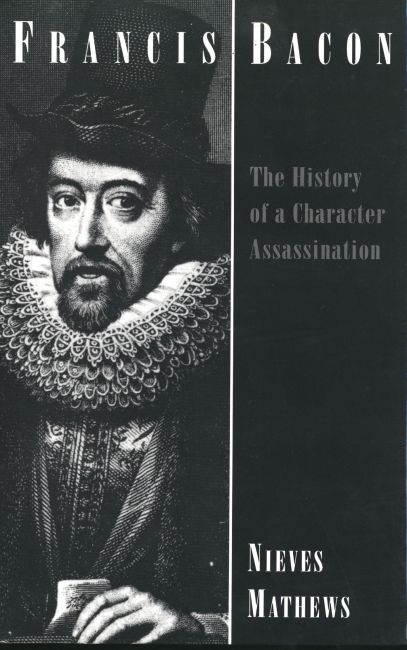
Insofar as the book is a study of Bacon’s reputation, there are comparisons to Niccolò Machiavelli. Like Machiavelli’s contemporary Thomas More, Bacon was both a scholar and a politician, as was Machiavelli. For all three of these men the ease with which erroneous assertions become fact by repetition is remarkable and once realised causes me to wonder what else in received option is equally erroneous.
To blacken Bacon’s name takes only a few words. To rebut and refute that assertion takes many pages to detail context, to infer intention, to shift testimony of eye-witnesses and so on. Believe me, Nieves Mathews is just the woman for the job of filling pages, though she complains more than once that she has too few pages to do the material justice. I took these asides to be references to the publisher’s insistence that the book end … sometime. She complains that Ignatius Donnelly’s book on Francis Bacon was too short to do justice to the subject. Too short at 900+ pages! See what I mean?
Essex is well known to anyone with even a slight knowledge of Queen Elizabeth. He was an attractive young man who captured the Queen’s interest and held it, despite some appalling behaviour. His indiscipline combined with hubris of considerable proportions such that he put himself forward for all manner of things, and he got some of them. He was promoted several levels above his competence. Thus was he sent to Ireland as the head of an army to quell the fractious Irish. For most of that campaign, at great expense to the public purse, he disported, drank Ireland dry, left no wench go unmolested, wrote piteous letters to the Queen lying about his noble efforts on her behalf, and knighted seventy (70) of his drinking buddies. That escapade alone, and it was not unique, gave his enemies ammunition for a lifetime.
Bacon counselled moderation to this wastrel with a patience that bespeaks the lack of alternatives. Bacon was Essex’s man and he did his best to help him. Of course, Essex knew no bounds and when his plot against the Queen foundered Bacon was safely clear of the fallout. Like many others in politics, Essex contended that his plot of seize the Queen was to protect her from others with sinister designs on her. Perhaps because even the dim Essex realised Bacon would not play, Essex made no effort to involve him in the plot. Or, more likely, Essex regarded Bacon as unimportant. None of the copious correspondence produced as evidence against Essex named Bacon as conspirator. Nonetheless he was guilty by association in the minds of many then and since.
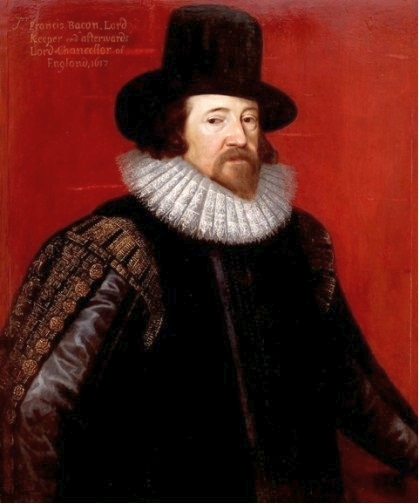
The story is not as clear-cut as summarised above. There have since been apologists and historians who see in Essex a victim of other forces. In that light, Bacon figures as a false friend who either betrayed Essex by revealing the plot, did too little to stop Essex’s mad scheme, or did too little to reconcile the Queen him. For the Essex-apologists Bacon’s treason to Essex is proven by fact that Bacon survived the drama and Essex did not.
Bacon’s reputation as a savant and public servant was sound for two hundred years until Baron Macaulay (1800-1859), wrote a hundred page essay on him, while resident in Calcutta during his tenure on the Indian Supreme Court. That got my attention because this same Macauley made a valiant attempt at about the same time to rescue Machiavelli’s reputation.
Back-and-forth through these 592 pages Mathews refutes every word Macaulay wrote and some he thought of writing but did not and still others he might have written. It is as thorough as a very expensive legal brief and just about as interesting to read. She is not one to summarise evidence when it can be paraphrased in full over pages and pages.
Macaulay started an anti-Bacon trend which she details from sources I never heard of but then I did not know his reputation had ever been blackened. She quotes letters to editors from literary magazines in 1891 to prove the point. Did I say ‘obsessive’ above? I did. It is. The thoroughness is that a PhD dissertation but it is not that, as I discovered when I tried to find out more about the author. For that see below.
Every card has been played against Bacon, she says, including the speculation that he was homosexual. My, my another comparison to Machiavelli who was accused of this practice by some plotting his downfall.
She also has a chapter on Bacon’s reputation in France, Germany, and Italy. No stone is left unturned. Among these enlightened Continental people he has long been recognised as a savant without equal.
‘I know of no other Renaissance writer who is so regularly vilified,’ said Brian Vickers (qv., p. 406). Brian should get out more. Try Machiavelli.
I did love her description of a Penguin edition of Bacon’s ‘Essays’ as aimed at discouraging students from ever reading them with the many derogatory things said of the man and his work in the editor’s preface. There is a student’s guide to Plato that is similar. Its editor, an Oxbridge don of high repute, is so plainly bored with Plato that he ends up making him boring. Penguin editions are cheap and available, but they are not always the best.
Overall this book is combative, sometimes polemical, but the subject matter saves it. Bacon was an interesting man and so were his times. Though it remains a mystery to me why Yale University Press published it. There are many mysteries out there, Scully. Another is the gentle review in the ‘American Historical Review,’ which went so far as to praise the writing style. Sometimes one suspects that reviews have not read all the way through a book.
Bacon’s claims to our attention are many. Along with several others he has been granted title to the plays and poems to which William Shakespeare put his name. Others have credited him with writing most of the works attributed to Michel de Montaigne, and still others say he wrote ‘Don Quixote’ in his spare time. True. He held two major public offices in the turbulent world of the Tudor and then Stuart courts: Attorney-General and Chancellor of the Exchequer. In addition, he served in parliament for many years. He articulated the scientific method, or at least, empiricism as a foundation for science, including particularly experimentation. His personal private secretary for some time was Thomas Hobbes, that giant of political theory. His personal physician was William Harvey. He knew a lot of big brains. Moreover, Bacon’s 40-page book the ‘New Atlantis,’ gave rise to cult of the Rosicrucians. However, some readers will be disappointed to know that he has nothing to do with the food of the same name.
The Child Bride gave me this book for Christmas some years ago. I tried to read it then and found it hard going. Feeling guilty after leaving it to ripen on shelf, when my eye fell on it recently I took it up to try again. Hard going. It is a specialist monograph based one extensive research into the time and place written without concession to an avocational reader (me), and the prose is leaden. Still it did get me thinking about Francis Bacon.
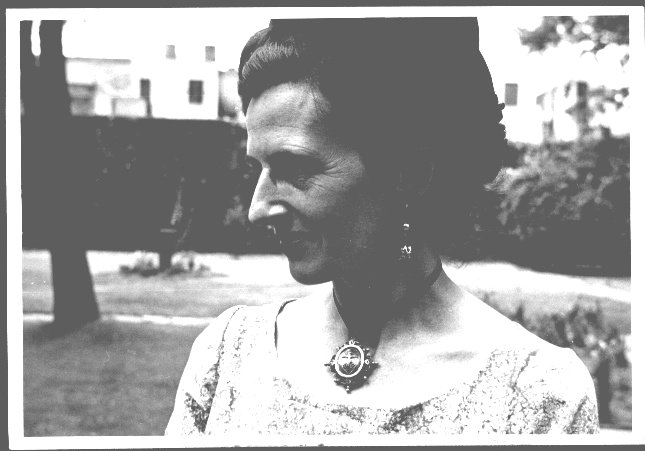
The author’s full name is Nieves Hayat de Madariaga Archibald, Mrs. Mathews (1917–2003). This from the Wikipedia stub: ‘She was also deeply influenced by the works of Immanuel Velikovsky. In her earlier years, 1956, she wrote a crime novel, ‘She Died Without Light’. She was inspired to do the Bacon book by Chandra Mohan Jain (1931-1990), also known as Acharya Rajneesh from the 1960s onwards, as Bhagwan Shree Rajneesh.’ Her guru told her to do it. If Velikovsky is unknown, my advice, is to leave it that way.
‘A Title to Murder: The Carhenge Mystery, a Western Story’ (2004) by James C. Work
I came across this title in March 2015 on a list of krimies set in Nebraska provided by the Omaha Public Library. When my eye fell on it, I knew I had to read it. Amazon came to the rescue with a copy. Carhenge! Been there, see that! Once you’ve seen Carhenge, it stays. We have tried for years to work Carhenge into conversations with the globetrotters we meet. Paris, Rio, Shanghai, Cairo, New York, these have little to offer in comparison. [Applause!]
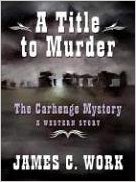
The setting is college summer school offered in Alliance (named by French trappers having taken a wrong turn from the Platte River, they were a long way from anything to trap)— class lists (inaccurate), class rooms (unready), dean (officious), photocopying machine (broken down), internet (off line), textbooks (not arrived), desk top computer for the visitor (inoperative), one pushy student (give me the syllabus now, four months before the session starts!), and more slack students (going through the motions for career or social purposes). In short, a typical summer school. The only thing I found hard to believe was a full professor from the University of Colorado had a modest mien and accepted this assignment and seemed to like students and teaching. That is not a creature I have caught sight of in our local zoo.
These students are largely elementary school teachers accumulating credits either for another degree or to comply with a continuing education requirement. That, too, is familiar. Inevitably one student comes late to the course and another to each class and both demand to know what has been missed (i.e., private tuition). Another underlines every word in the reading but cannot answer any question about it (trees without a forest in sight). Par for any course.
One of the students disappears from class. Yes, that happens. But a few days later her boyfriend is found with a very big knife stuck in his very dead body…. Everything indicates she did it. Now that is not par for any course.
Moreover, she was a thoughtful and bright student who had befriended (advised and counselled, he discovers) several of the other women students. Could she be the culprit?
David McIntyre, our hero, wonders about this and he meets a few local people who, knowing her better than he does, also wonder. The pace is deliberate, and the passing parade of small town characters is given its due. The freelance mechanic, a weedy, bony, twenty year old with tattoos and studs, who longs to be a tough guy but keeps tripping over things, he is a hoot. The denizens of the burger joint act as a Greek chorus. Then there is the heat in the panhandle – open spaces are no-go zones after 10.30 on a July morning. The canopy of elm trees captures and holds a stifling, albeit shady, heat beneath, dark and hot like an oven. Most of all, there is: Carhenge.

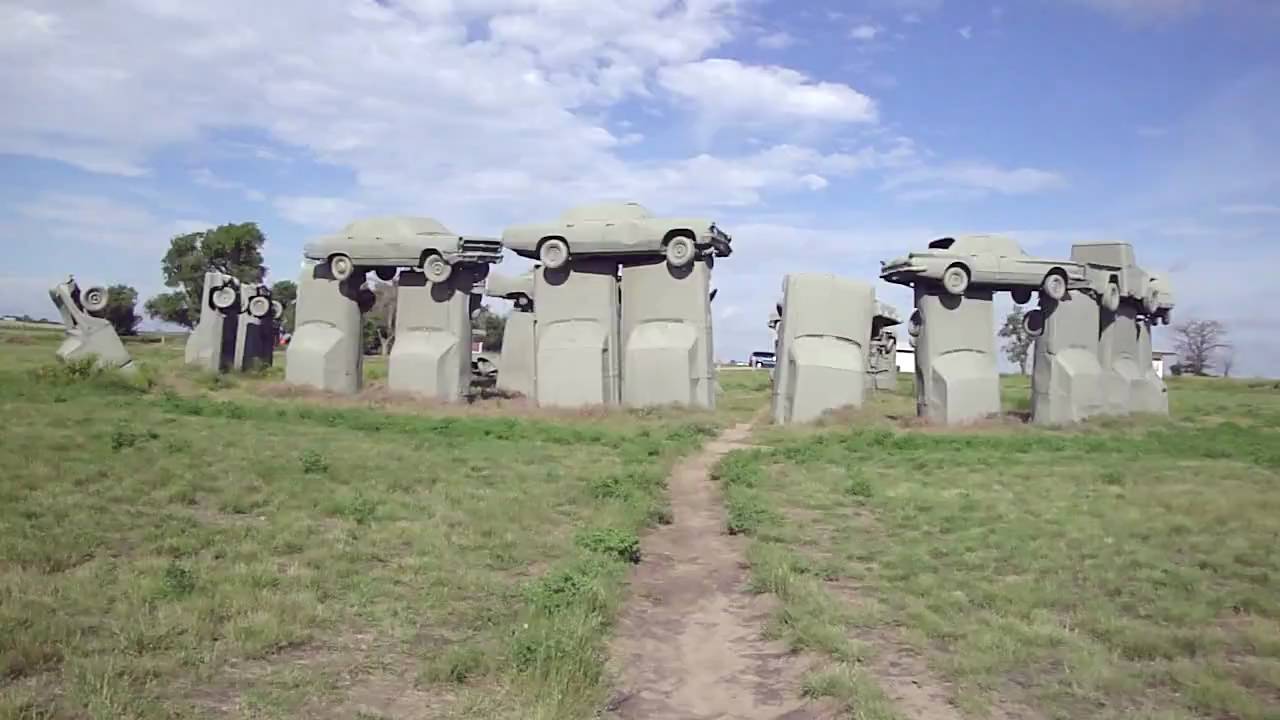
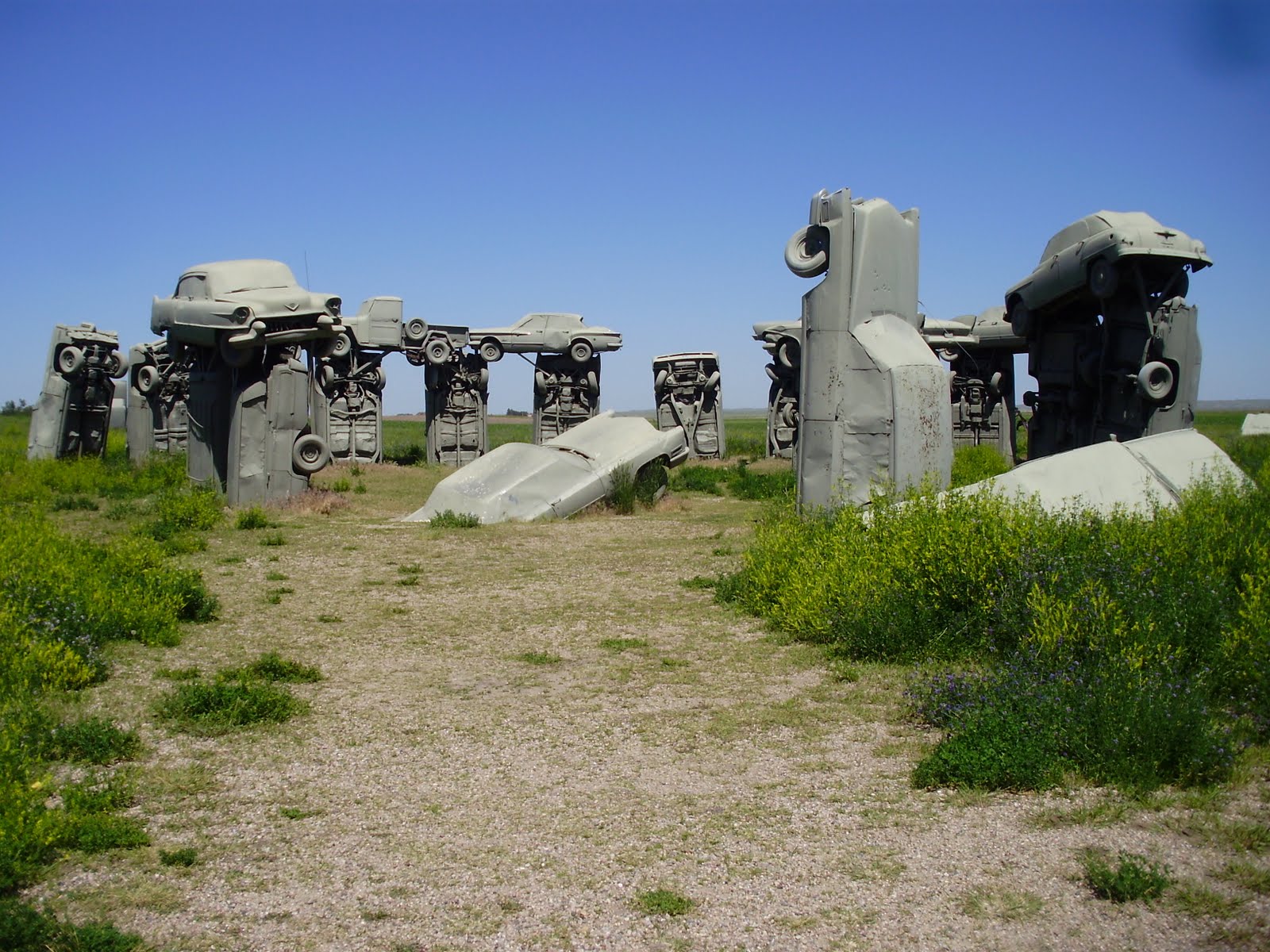
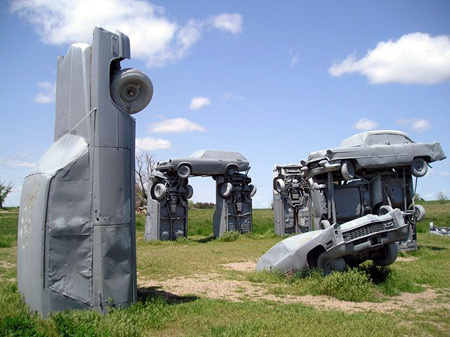
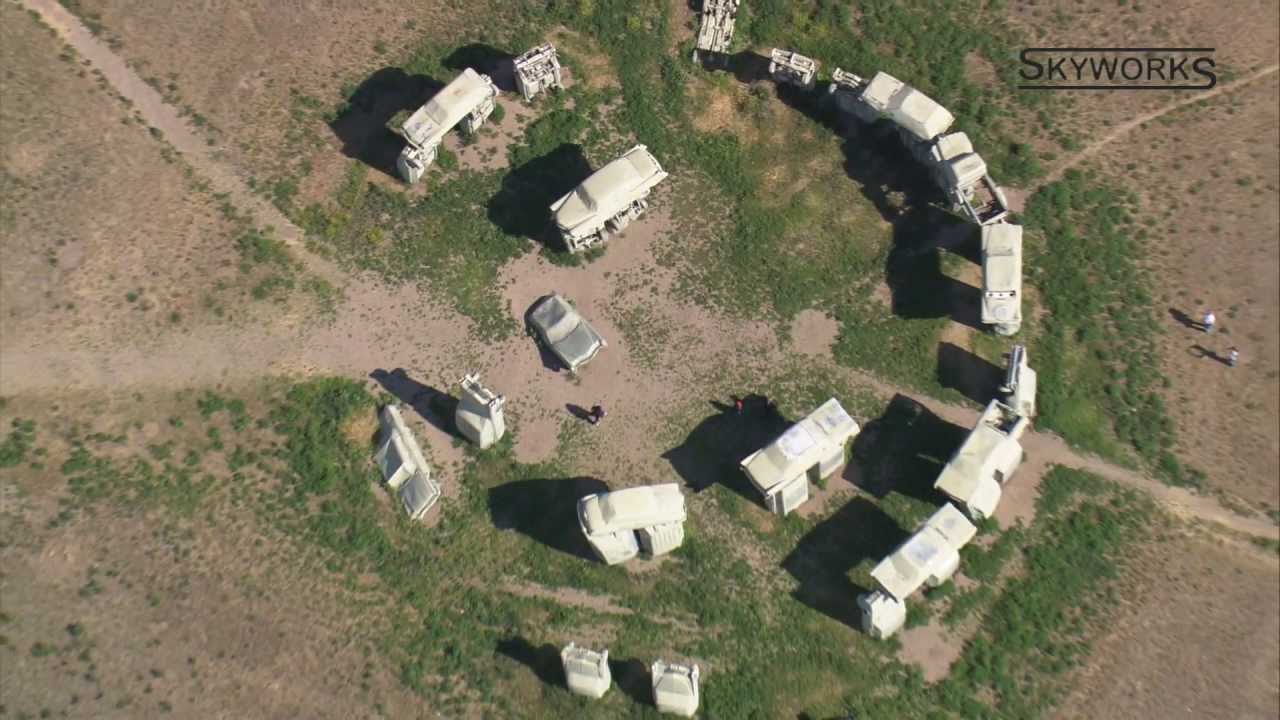

The book gives instructions on the best method of viewing the site. To find that out, read the book for I shall not reveal it here. I hope to visit Carhenge again myself next year and make use of the instructions I found here.
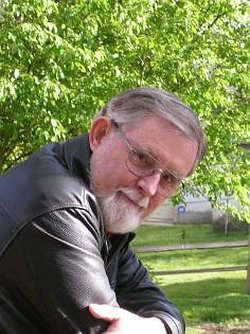 James Work
James Work
That the plot turns on several novels is great fun and very well realised. There are other literary krimies but none quite like this where life is art is life. Readers of the book will follow. Readers of ‘Tess of the d’Urbervilles’ will put 2 and 2 together and get Carhenge.
If Carhenge is unknown, add a brick to the wall of knowledge by reading about it on Wikipedia, or see the film! [Yes, Mr. Spock, there is a film.] Best of all, pay it a visit.
‘The Politics of Rage: George Wallace, The Origins of the New Conservatism, and the Transformation of American Politics’ (2000). 2nd ed. By Dan T. Carter
Three men publicly declared their intentions to run the first time for public office within hours of each other, one in Massachusetts, another in California, and the last in Alabama: John Kennedy, Richard Nixon, and George Wallace (1919-1998), and despite his four presidential campaigns the latter, Wallace, has all but disappeared from the popular consciousness. The evidence is celebrations of anniversaries reported to television and the shelves of bookstores. Kennedy and Nixon appear now and again in those places. Pigmies (journalists) till occasionally try to hack a byline out of Kennedy or Nixon. Scholars continue to evaluate their achievements in monographs. The fiftieth anniversary of this or that has commanded television time. Hits on the internet are millions for Kennedy and Nixon.
But George Wallace, though in the time he preoccupied both Kennedy and Nixon, and commanded headlines around the world, is now all but forgotten except to specialists in American regional politics. Moreover, later in life, outwardly Wallace executed a 180 degree turn in his public persona and went from a fire-eater to a grand old man. Who was George C. Wallace?
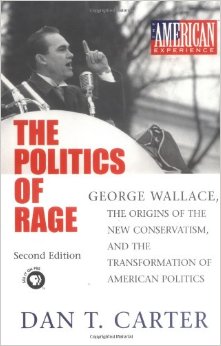
He was the oldest son in a comfortable family, though its fortunes had declined in the previous generation, along with millions of others when the Great Depression hit. George completed high school and graduated from the University of Alabama with the help of the G.I. Bill of the (later despised) federal government.
He was small, and often called ‘Little George’ rather than ‘George, Junior. ‘ If that irritated him, he found an outlet for any resentment in Golden Gloves boxing. He did well in that as a bantam weight. More than once knocking out an opponent. As one coach said, George did not want to win the fight, he wanted to hurt his opponent. Trying to teach him to score points for a technical victory had no effect. George did not want to score points, he wanted to deck his opponent, draw blood, and have KO recorded. The pugnacity he showed later was there from the beginning.
He had served in the United State Air Force in the Pacific War and flew nine missions in a B-29 over Japan. He was the flight engineer for the large and complicated airplane. While the Japanese defences were weak sometimes it only took one hit to bring down even one of these super fortresses. In addition, the distances, the weather, the fatigue of the crew on 16-hour flights in combat conditions, and the temperamental nature of the aircraft combined to produce 5% losses on every sortie; if 500 planes took off for a mission, 475 made it back. Each plane carried 11-crewmen and so that meant 275 deaths. Yes, deaths because when the planes went down, whether over Japan or open water, all hands were lost. Air-sea rescue existed but the vast expanse of the Pacific ocean over a 6,000 mile course made recovery a million-to-one shot.
On at least one flight Wallace’s handling of the engines, the fuel flow, the oil pressure, the hydraulics saved the plane from disaster. Later he secured an honourable discharge despite some dubious behaviour. (From the details in these pages I rather think he served in the same unit as my father, likewise from the South, but there the similarity ends.)
When the war started Wallace knew he had to serve in order to secure his future political ambitions. And he had political ambitions that were articulated from about 15 years of age. He earned a place as an intern in the Alabama legislature and declared that one day he would be governor. Many a boy and today many a girl has done something like this. Few of them, however, conducted the kind of campaign he did to secure that internship. In early summer when school was out his father drove him to the capital, Montgomery, and young George laid siege to the legislature like Grant before Richmond. He had already written a stream of letters to every member of the legislature explaining his exceptional merits for one of the very few internships available, pledging to serve above and beyond the call of duty. Once in Montgomery he presented himself at the door of one legislator after another and talked his way into most. He slept at least one night in park and gave his suit an undergraduate iron, i.e., he slept on it. His father left him to his own devices. For the first but not the last time, Wallace wore down his adversaries and he got an internship. He loved it, and did do twice the work any of the others.
The man was something of a loner despite coming from a family of five children. He could keep to himself for days at a time, as he often did during this internship and later in the Air Force, but if he was with other people he was garrulous, excited, nervous, twitching with energy, and talking, and talking, and talking nothing but politics as one contemporary after another says, though what politics he talked from fifteen onward is not clear.
What is clear is that he had a burning ambition and politics was the field. The two defining poles of Southern politics were (1) hatred of the North (Federal) government because of the Civil War and Reconstruction and (2) white superiority at the cost of black oppression. The former meant that the federal government was the real enemy, though the largess from FDR’s many programs was quickly pocketed in the South, it was nothing more than overdue compensation for the great evils the North had visited on the South. Suitably encoded for contemporary sensibilities, we hear the same motifs today from the Tea Party and its media service, Fox News.
Leaving aside the details, which are thoroughly documented and dramatically presented in this book, from the beginning Wallace was a hollow man.
Wallace had a gigantic need for recognition which translated into an unquenchable ambition for political office (even before taking the oath of office as governor the first time he referred to running for president ‘next year’) that combined with his belligerent temperament. To serve that ambition he would cheat, steal, and lie while denying everything. His defiance of the federal government on civil rights was – it is abundantly clear – contrived to lock-in the white vote for his ambitions. He had no interest in the constitutional or legal aspects of the dispute. Nor did he seem to have any personal animosity to blacks. As Hitler never personally harmed a Jew, so Wallace never harmed a black person. Racism was necessary to win and he would not be out done in that. No sir! If racism got votes, he would talk racism day-and-night. Against such singleminded determination, the federal government wobbled. The Kennedy Administration wanted compromise not confrontation but Wallace wanted confrontation (before the television cameras) and not compromise of even the most cosmetic kind.
Wallace promoted the mayhem of Selma and the maelstrom of Birmingham. The descriptions of the bomb, the razor, poison, the truncheon, C-4 teargas (which is toxic), the torch, the shotgun, the knife, the pistol, the high-pressure firehose that broke limbs, the baseball bat, and the snarling police dogs, and let us not forget the electric cattle prods were, as one French journalist said, worse than any he had ever seen in banana republics. Wallace was indifferent to the blood he had let, ever ready to blame someone else. His message was clearly understood by those whites who wanted to fight. The haters came out in force and Wallace privately invited the Ku Klux Klan to mobilise to the drive the blacks off the streets.
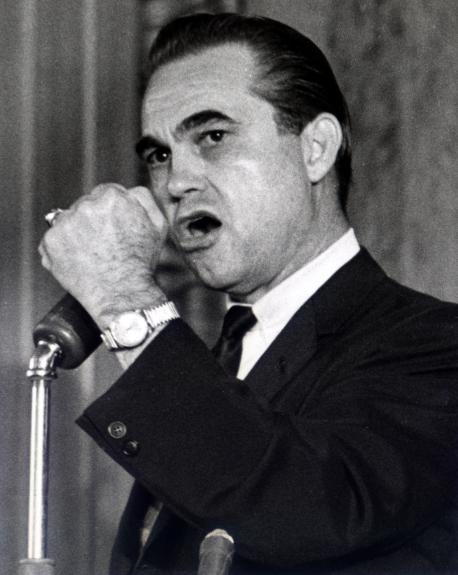 George Wallace. ‘Segregation now! Segregation tomorrow! Segregation forever!’
George Wallace. ‘Segregation now! Segregation tomorrow! Segregation forever!’
Before reaching for stereotypes about Alabama, it might be noted that in the 1920s a governor of this very same state, Oscar Underwood (1862-1929), sacrificed his political career, including his own presidential ambitions, to confront the Klan. Equally, Wallace’s immediate predecessor in the gubernatorial chair, Jim Folsom was an advocate, albeit inconsistently, of racial accommodation. Wallace’s constituency was always a minority but it was an intense minority that he had identified, legitimated, recruited, mobilised, and unleashed with the full support of the state government and the connivance of some of Alabama’s Washington representatives and senators. I said ‘recruited’ because there is evidence that some of the perpetrators had flocked to Alabama from other states to seize the opportunity to crack skulls.
Wallace had found, as did another Southern midget, Alexander Stephens (1812-1883), that crowds were bored when he talked about states’ rights but responsive when he went in for race-baiting. What was am ambitious man to do, but play the race card? It was the only card in the deck.
Having just read some of the Robert Penn Warren’s essays written at the same time as Wallace was at his pinnacle it is hard to believe these two Southerners came from the same planet.
While Wallace ranted and raved at the evils of the federal government, he continued to receive and bank his monthly check for his war wound. War wound? His discharge was based on his unfitness for further duty due to mental instability, i.e. combat fatigue. For that disability he received a part-pension for the rest of his life. Imagine what an opponent as unscrupulous as Wallace himself would have made of that fact.
Wallace had a retentive memory and he made a point of remembering people he met, because they might be useful later, but he had no rapport with them, unlike Huey Long. They were assets to be catalogued not people whom he could help. Long’s faults are encyclopaedic but he never played the race card. There is a coldness at Wallace’s core, which is also evident in this relationship with women, including his ever loyal wife, Lurleen. So seldom did he see his children that she wondered if he would recognise them in a crowd.
In all he served three discontinuous four-year terms as governor, and his wife, Lurleen, served one four-year term as his surrogate. As to Wallace’s change of heart after his own ordeal, the author is sceptical. Wallace’s injuries were terrible and left him in constant pain. But after so many years and so many lies, perhaps the one person who believed his lies was George Wallace. The author gives very short shrift to this period in Wallace’s life which I took to be a silent comment on Wallace’s credibility.
Reading this book brought back those times to me, and it was disturbing to recall those days of the news each night of blowing up children in churches, burning to death families at the kitchen dinner table, the murder of university students in the street, a woman beaten to death with baseball bats by five men in a town square.… Worse, the culprits in many cases were well known, and some openly bragged of their deeds, others were on-duty police officers. Looking back, it beggars belief. I had no wish to see ‘Selma.’ The original was enough for me.
The author goes to remarkable lengths to be even-handed and let the facts speak for themselves. They do.
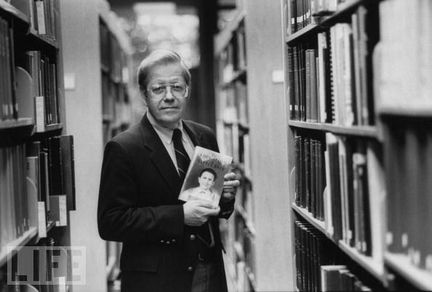 Dan Carter
Dan Carter
Presidential campaigns. Wallace’s strategy was to produce an indecisive election, i.e. no candidate with majority of electoral votes, and throw the (s)election of the president into the House of Representatives as prescribed by the Constitution at the time. There a combination of Southerners with some Northerners from blue-collar constituencies might give him enough votes to wangle a Vice-Presidential selection, and from that base the next time he would be the leading contender for the top job. It is not as crazy as it sounds.
1964. Wallace entered and campaigned hard in three Democratic primaries, Wisconsin, Indiana, and Maryland, and did well. That ended the supposition he was a regional politician with no appeal outside the deep South. After dropping out, privately he offered his support to Barry Goldwater in return for the Vice-Presidential place on the Republican ticket. Goldwater declined. LBJ swept all before him.
1968. Wallace ran as a third party candidate with Curtis ‘Bomber’ LeMay. Richard Nixon won but he feared that Wallace would split his vote. Once again Wallace let it be known he would accept the Vice-Presidential slot on first the Democratic and the Republican ticket. This messages were ignored. He got ten million votes, carried five deep South states with forty-five Electoral votes. This was his high tide. He seems to have taken votes from blue collar workers in the North who might have otherwise voted for Hubert Humphrey and from Southern rednecks who might otherwise have voted for Nixon.
1972. Wallace entered the crowded Democratic primary field and won Maryland, Michigan, as well as Florida. Once again he approached Hubert Humphrey through an intermediary about the Vice-Presidential slot and once again Humphrey did not respond. While Wallace got votes, George McGovern’s campaign was more astute at getting delegates, and there was never a chance Wallace could win, but he could certainly be a spoiler. Nixon was delighted to see him in the Democrat chicken coop but worried he might bolt once again and run as a third party candidate. Many calculation were made. Among McGovern’s campaign staff were Bill and Hilary Clinton. Then that weirdo shot him. HIs assailant sought fame and barely knew who Wallace was. One weirdo too many.
1976. In a wheel chair he entered another crowded Democratic primary field but had little impact and dropped out quickly. He was allowed to address the convention, but he was a shadow of the rabble rouser he once was, and his effort to play the elder statesman was lame. Jimmie ‘Who’ Carter won and won again, the nomination and the election.
Footnotes to Wallace
Hatred and fear, these win elections. This was the lesson the Republican Party took away from the Wallace experience it has gradually make its own since. To paraphrase a Republican campaign analyst in 1968, find out what they fear, find out what they hate, and play to those and only to those. If white blue-collar workers fear that lower-paid blacks will take their jobs, play that card. If white middle-class suburbanites fear blacks will move into the neighbourhood and lower real estate values and mix races, play that card. ‘Playing the card’ means articulating these fears for them in a way that is socially acceptable but unmistakeable — code it — so that they can say it and in so doing realise they are not alone. This crystallised into ‘The Silent Majority’ which was hardly silent and probably not a majority, but it was a brilliant conceptualization. People motivated by hatred and fear will go to the polls and vote. Wallace’s campaigns both in Alabama and in northern primaries brought many hundreds of thousands first-time voters to the polls in general or primary elections. That campaign manager used other examples and expressed them much more forcefully than I have done in deference to the PG-17 rating of this blog.
Demeaning accounts in press. The resentment that Wallace bore toward the North and its surrogate, the federal government, is easy enough to understand when reading the contemporary press accounts of him, his followers, and his campaigns quoted here. The ‘New York Times,’ ‘Time Magazine,’ CBC-TV News, all struggled to find a slot into which to place them, and they settled on the easiest one to hand. Drawing on their knowledge of the South from reading Al Capp’s ‘Lil Abner’, the pigmies of the Fourth Estate labelled them hillbillies, rednecks, hicks, yokels, and rubes. The early descriptions of Wallace on the campaign trail in North reek of condescension and deprecation. Everything about him was described as though he were a specimen in a jar, his wristwatch, his haircut, his finger nails, these were all subjected to the journalistic acid test, namely, can I get a byline out of this?
‘Detective Dee and the Mystery of the Phantom Flame’ (2010)
Robert van Gulik (1910-1967), a Dutchman, wrote a series of krimies featuring Dee. Gulik was an orientalist and lived most of his life in the Far East. Scrupulously following the trail of historical authenticity in the novels, Gulik’s Dee is a judge, rather like a circuit court judge who travels around China finding wrongs and righting them, and not a detective. One supposes that the label ‘detective’ is used to make Dee accessible to contemporary audiences, unlikely to know their own history. Having read a couple over the years, when I saw this title in the SBS line up, I was curious to see what contemporary Chinese would make of a European’s appropriation of their society fifty years ago.
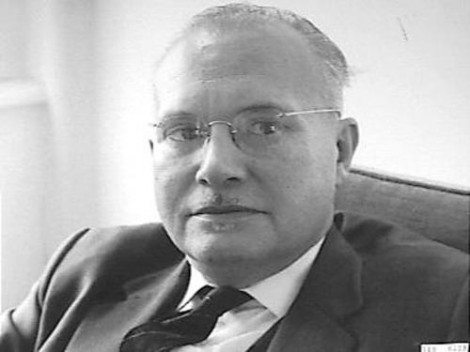 Robert van Gulik
Robert van Gulik
The short answer is not much. This is an original story, per the IMDB information, and the title does not match any of Gulik’s at my glance. I rather think this film takes more liberties with Chinese historical accuracy than did Gulik. It seems as free as a Hollywood script, veering this way and that, with talking animals, ghosts, and other excuses for CGI, CGI, and more CGI, without a meaningful story line or characters with any depth. A moving comic book, but then Stan Lee has ascended to royalty on that. I let it run but assigned only 1% cognitive attention to it while plowing through the NYT Sunday crossword puzzle.
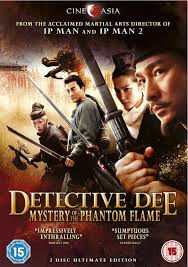
IMDB scores is 6.6 and some reviewers found it ‘enthralling’ and ‘sumptuous.’ I found it repetitive, predictable, incomprehensible, and boring by turns. Something for everyone then.
There are ghosts in the Dee stories I know, but inevitably it turns out that some villain is trading on the belief in ghosts to get up to some dastardly deed, and the no-nonsense Judge Dee soon settles that!
‘A Robert Penn Warren Reader’ (1988).
The volume offers a selection of this prolific writer’s oeuvre, poems, essays, plays, short stories, excerpts from his novels, forwards and prefaces he wrote for the books of others.
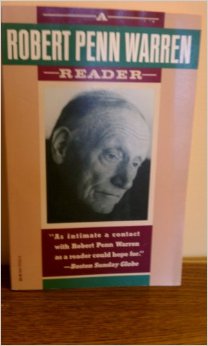
Warren (1905-1989) wrote one of the best novels ever, especially for political junkies, ‘All the King’s Men’ (1947); three or more times butchered by Hollywood, it remains evergreen despite the assaults by the Tinsel Town pigmies.
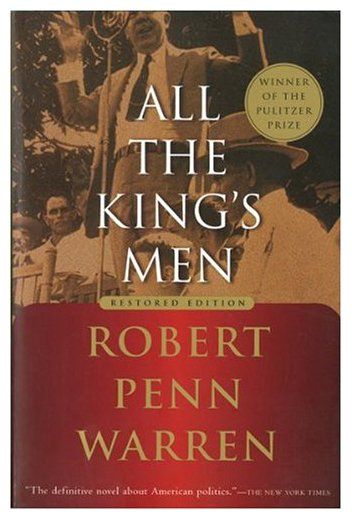
The opening of that novel strikes an hypnotic chord in which the rest of the story unfolds. Marvellous.
Most of the items in this collection were composed between 1940 and 1965. He was Poet Laureate at the Library of Congress in the 1970s and his greatest fame lies in that world, poetry, amply vindicated by the poems included in this volume, each a small study of nature or humanity.
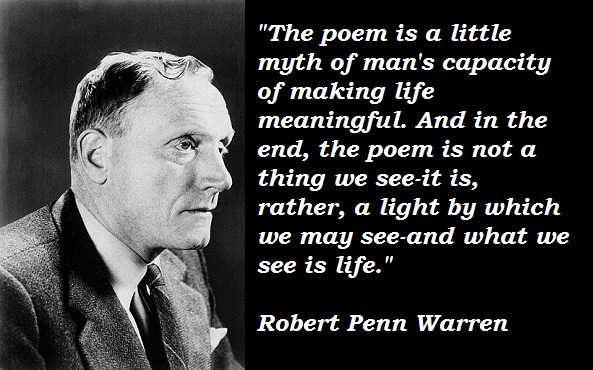
Like many others of the South his greatest challenge was the obvious one of slavery past and racism present. As an undergraduate he defended segregation, as did his professors and peers at Vanderbilt University, including that other remarkable Southern poet, Allen Tate, but Warren grew out of it and quickly, unlike Tate. Warren’s short monograph ‘Segregation’ (1956), included between these covers in its entirety, offers his personal bildungsroman along with penetrating insights into the manifold evils segregation spawned. Though this account lacks the hellfire and brimstone of his comrade William Faulkner’s many denunciations of the racism, being more cerebral and measured, yet it strikes hard, sure, and deep. His reference to the remark attributed to a Southern plantation wife says it all, but so succinctly and so swiftly that I had to read it twice to get it. ‘Mr. Lincoln freed me of slavery and I thank him for it.’ (Either you get it or you don’t.)
Among the pleasures in this volume is a short but layered appreciation of the nineteen novels of William Faulkner. Faulkner’s many failures and weaknesses, on Warren’s telling, were essential to Faulkner’s astonishing successes and strengths. The man was whole and so is his work, and that is how we must take it.
The same themes run through his commissioned monograph ‘The Legacy of the Civil War’ (1961), included here. There is too much in it to summarise but to this reader the most striking passage is when Warren asks readers to imagine Robert E. Lee shaking hands and congratulating the strutting Southern governors of the 1950s and 1960s barring children from schools, encouraging baying crowds of Bible-grasping gorgons to shout abuse at girl scouts, licensing hissing mobs to burn churches, sanctioning lynch parties, ignoring rape and pillage for sport, and praising masked men hiding in the dark.
A close examination of pictures from the March on Washington in 1963 will show Warren there on the steps of the Lincoln Memorial come to give his own thanks.
He received three Pulitzer Prizes for his work, living most of his latter years in New England, no longer welcome in his homeland, and it shows in the poetry.
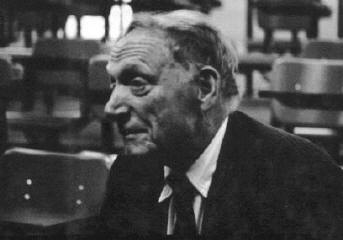 In a classroom at Yale University where he taught for years.
In a classroom at Yale University where he taught for years.
The wonders of nature and humanity remain many and varied, but the sense of loss and disconnection is but palpable.
A callow undergraduate, I heard him recite some of his poems and the memory has since remained bright. There are some short excerpts on You_Tube.
Miguel de Unamuno, ‘Abel Sanchez’ and other stories.
Listening to John Stuart Mill’s autobiography reminded me of a story by Miguel de Unamuno (1864-1936), a pioneer in existentialist fiction and philosophy in Spain. That name by the way is Basque and though ‘Unamuno’ clearly means ‘one world’ it is not from any known language. In this as in other ways, he was one of a kind. He wrote fiction, poetry, drama, and essays.
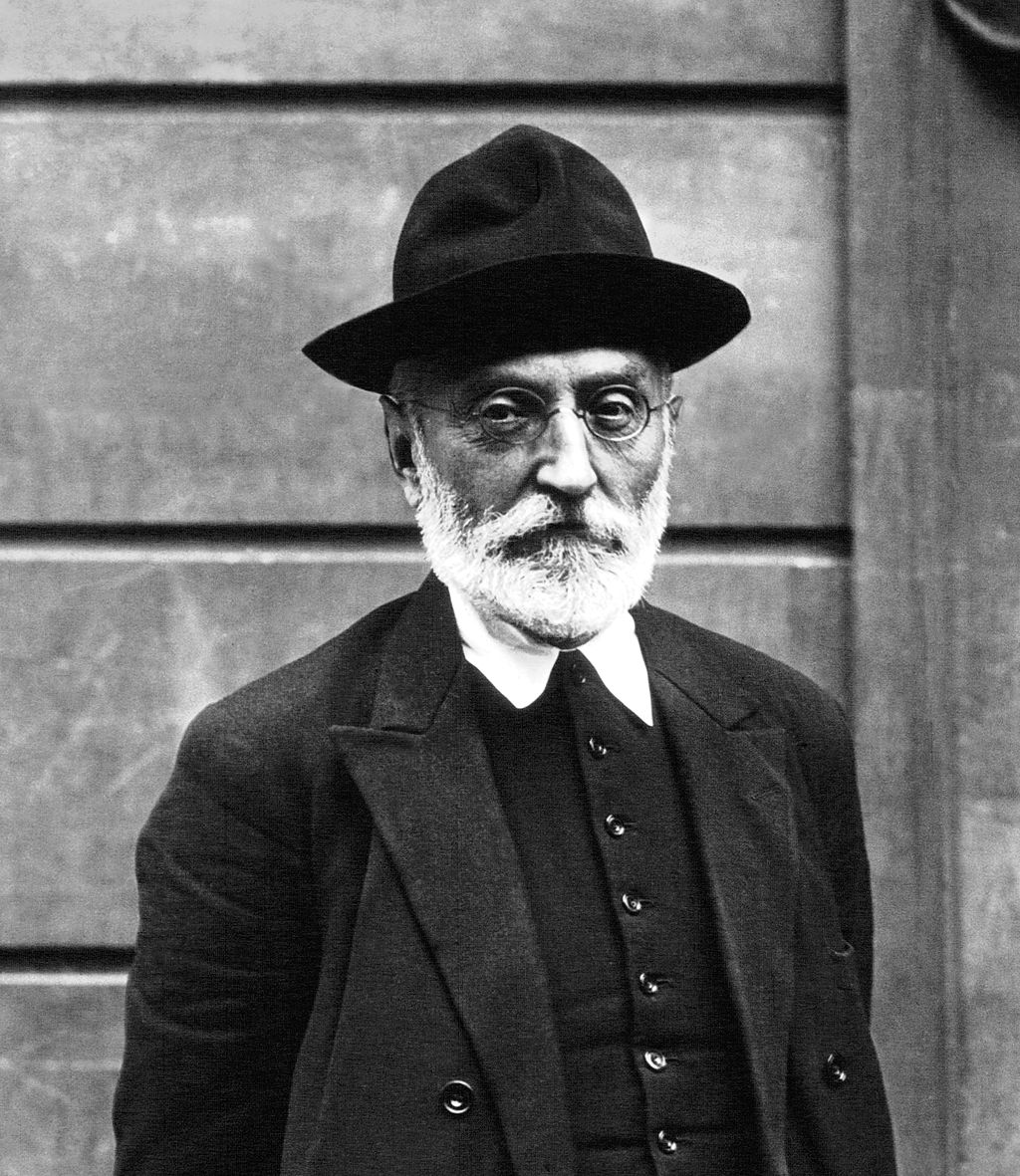 Miguel Unamuno in 1925.
Miguel Unamuno in 1925.
When Mill talks about losing faith in unified and theoretical solutions to human problems, it echoes Unamuno’s story ‘Saint Emmanuel the Good, Martyr’ of the eponymous priest who loses his faith in God and yet continues to minister with continued dedication to ease the lives of his parishioners. It is a very moving story of self-sacrifice, told in a slow and subdued manner over sixty (60) pages. The scene in the confessional when he, the priest, confesses to the young penitent Angelica his loss of faith is remarkable. Readers will long remember Don Emmanuel and his daily struggle to act as though life has meaning.
The second story is ‘The Madness of Doctor Montarco’ which is social criticism, and daring for the time and place. Montarco is a fine physician and as a pastime he writes and publishes in newspapers and magazines ever more farfetched stories which we might label as fantasy or science fiction. His patients begin to doubt his ability and reliability because of these stories, despite the evident fact, attested to by other doctors, that he is treating them very, very well. The patients lose confidence in him and desert his practice, and as this happens the stories he writes become ever more bizarre and disturbing to readers, until he finally enters an asylum to live out his remaining days a confused and broken man. It is a story about the fate of those who do not conform to the narrow channels of the Catholic and conservative society of Spain which rejects this re-born Don Quixote. This is a twenty (20) pages story.
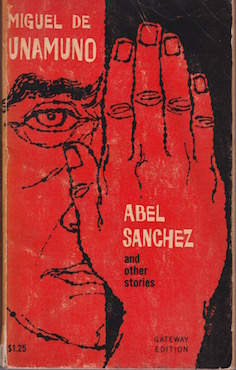
The title story is a short novel of 176 pages, ‘Abel Sanchez’ in which Unamuno tells anew the tale of Cain and Abel in contemporary Spain circa 1930. It is a marvellous study of the jealously, envy, and madness of Don Joaquín (Cain), another doctor, who hates his best friend Abel Sanchez for all his apparently easy success in life and love, and Joaquin plots his downfall. I read the first sixty (60) pages in a gulp. Abel is a painter whose work acquires much recognition and financial success and leads to his marriage to Joaquín’s cousin, Helena who had earlier refused Joaquin’s proposal. He, the man of science, who saves lives is shadowed by this frivolous artist and trumped by him at every turn. Yet such is Unamuno’s artistry that Joaquín is largely a sympathetic character, as are Abel and Helena. That is the tragedy, there are no villains here and yet there is destined to be a collision.
By the way all three of these works were put on the Index Librorium Prohibitorum, forbidden to Catholics.
The tattered copy I read was an undergraduate text from my college days for which I paid $1.25 in 1967. I have read and re-read it several times since.
The dictatorship of Primo de Rivera exiled Unamuno to the Canary Islands from when he escaped to live just across the border in France. HIs writings were considered incendiary, including the works of fiction above. He returned when the Popular Front government took office in 1936, though one can hardly describe him as a liberal, a socialist, a communist, or an anarchist. He was a staunch Catholic but one who could see the reality behind the curtain. In any event when the Civil War came he denounced it very publicly from the lectern in Salamanca where he was rector of the university with members of the junta sitting in the audience and on the stage while he spoke. It must have been electrifying to see this hunched and weary old man challenge the Goliaths in their gold braided uniforms and sidearms. He was nearly lynched on the spot.
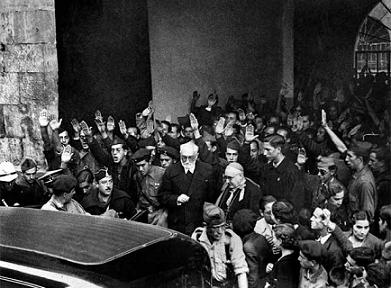 Passing through an angry mob of Nationalists.
Passing through an angry mob of Nationalists.
He died a few weeks later. Federico Garcia Lorca was murdered even earlier that year, he being another genius of Spanish letters. There are now monuments to both of these writers, but none to the men who killed them.
‘Jeremy Thorpe’ (2014) by Michael Bloch
This is a lengthy and detailed biography of one Jeremy Thorpe (1929-2014). Jeremy who? He served in the British parliament for twenty years (1959-1979) and was leader of the Liberal Party, 1967-1976, until a spectacular fall from grace. Educated at Eton and Oxford, he was a scion of the upper middle class of his time and place, reared by nannies, sheltered and seldom disciplined. His mother doted on him as the only boy in the family to the occasional resentment of his two older sisters. Jeremy was fifteen when his father died, and thereafter the money slowly ran out.
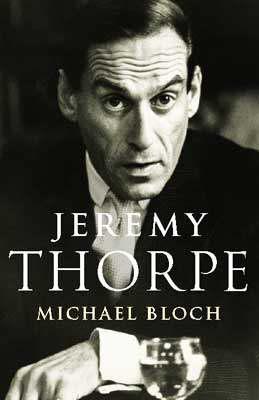
When German bombing threatened in 1939 his parents sent him (and the girls) to the United States, where he spent three years in middle school. There he found the environment freer with more emphasis on individuality than the conformism stressed at home. He was neither athletic nor bookish. He had a ear for music and accents, playing the violin quite well (sometimes in public) and mimicking teachers to the amusement of his peers. That combined with a theatrical bent, though he did not act in school plays. He craved to be the centre of attention, dressing to catch the eye, making grand entrances, and saying things to surprise or shock. This is all rather like most adolescent boys, but he did not grow out these but cultivated them as he matured. By the same token he was considerate of others, egalitarian in manner, one who looked to the future and not the past, gregarious, optimistic, and energetic, this latter being, I have always thought, an essential for anyone in politics. His American experience left him with a lifelong commitment to the Special Relationship across the Atlantic.
He had powers of concentration and a retentive memory. He would have made a good barrister, one who could absorb a brief inside out, as they say in chambers, if only he concentrated on it. If someone told him about a book he took it in, and made it his own, so that later if he told someone else about the book, it sounded as if he had read it himself. He focussed on people and he was good at remembering names. When he talked to someone – a duchess at a soiree or a dustman at a political rally — he locked onto them as if, for those moments, they were the most important people in the world. He did not fidget and look over their shoulder for someone else more important to whom to talk. These are assets in campaigning. But he was not particularly adept at debating and if challenged on a point by either the duchess or the dustman he was likely to escape with a quip or laugh.
Much influenced by family friend Lloyd George’s example, he committed himself to the Liberal Party nearly in cradle and never wavered from that though by the time he entered politics, it had been nearly extinguished. His mother was a dyed in the wool Conservative who held an elected office the local shire council, but she was unstinting in her support for his ambitious, and perhaps always hoped that he, like others who started out as Liberals, Winston Churchill and Harold Wilson, would change. He spent his years at Oxford pursuing impressive offices, ending as president of the Oxford Union. He was a very poor student and barely completed the law degree and only passed the bar examination on a second or third sitting thanks to the great effort of a chum to prepare him. He was an indifferent barrister, best at appealing to a jury’s emotions and completely unaware of points of law or court procedure, with no grasp of detail, as more than one judge said. His real interest was always politics.
While a student he campaigned often for Liberals in General and By Elections. When he was old enough, rather than vying for one of the very few safe Liberal seats, which might have been possible due to retirements, he picked a rock-ribbed Conservative constituency that had not voted Liberal in two generations, and set to work and seven years later he was elected. The man had application.
He made little money from law, but when ITV was born he applied for a job there and become the host for a popular science program. In an age when all television was live to air, he was just the man, an easy manner, a ready smile, a quick wit, an adroit ability to segue over cracks in the proceedings. He became a reporter on international news and went to Africa for the independence celebrations in Ghana, and he kept travelling and reporting as the Empire converted itself to the Commonwealth. He met and befriended many of the leaders of the emerging nations in Africa, and did his best to explain their causes to his audience in Great Britain. He had a career in television for some years while still practicing law, when there was client, and working in the constituency. Television gave him exposure but very little money. He practiced law in the constituency, too, at cut rates to establish himself. For years he wore his father’s clothes to save money but that also made him seem a dandy from another age that appealed to his sense of theatre, and he lived at home with his mother in Surrey from which he travelled on British Rail to London and North Devon, the constituency, and in all those hours on trains, he chatted up one and all, some of whom recognised him from television and he lapped that up. The man loved an audience. The first time he ran in North Devon he doubled the previous Liberal vote and lost. Four years later he doubled it again and won.
When Jo Grimond retired as Liberal parliamentary leader, Thorpe became leader of the ten Liberals in the House of Commons. Though the Liberals were then a tiny party in electoral terms they retained an elaborate party organization from the days when they were a governing party, councils, assemblies, committees, and boards in profusion. Thorpe proposed changes to streamline that but those who sat on those councils, assemblies, committees, and boards resisted, though they did next to nothing to promote the Liberal cause in the electorate. He then did the next best thing and ignored them. He had three jobs: member of parliament, barrister in London, and travelling correspondent for television, and now leader of a parliamentary party. It was too much even for him, and he quit the law which brought in less money than the cost of the chambers.
In politics he was a vigorous champion of human rights, at the forefront of many campaigns against apartheid in South Africa and the rebel regime in Rhodesia. He also espoused equality for women and recognition of homosexuality in British legislation. He likewise advocated British entry into the European Community. The high water mark of his career was 1974 when the Liberal won 20% of the vote and in the consequent hung parliament, the prospect of a coalition government arose. The Labour leader Harold Wilson wanted another election, not a coalition. Edward Heath, the incumbent Conservative Prime Minister conferred with Thorpe, but Heath refused to consider electoral reform, i.e., proportional representation, ending that brief episode. Sound familiar? In 2010, for those who have not been paying attention, the Liberals entered a coalition with the Tories and for their trouble were obliterated in the 2015 British election to the benefit of the Conservatives.
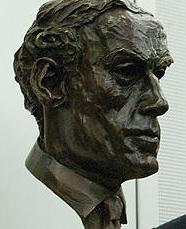 Bust of Thorpe in the House of Commons.
Bust of Thorpe in the House of Commons.
In this period Harold Wilson, first as leader of the Opposition and then as Prime Minister, encouraged the Liberals because they siphoned most of their votes from the Conservatives. Accordingly he always treated Thorpe well, invited him to events, praised his speeches, allowed him some patronage to distribute, enacted legislation that gave tax benefits to those who contributed to the Liberal Party, sent cars to pick him up…. By contrast Edward Heath found Thorpe a poseur of no substance, and could hardly abide him and made no such efforts to court him or the Liberal Party. What a triumvirate! Heath the detail-minded plodder, Wilson the wheeler-dealer, and Thorpe the razzmatazz showman.
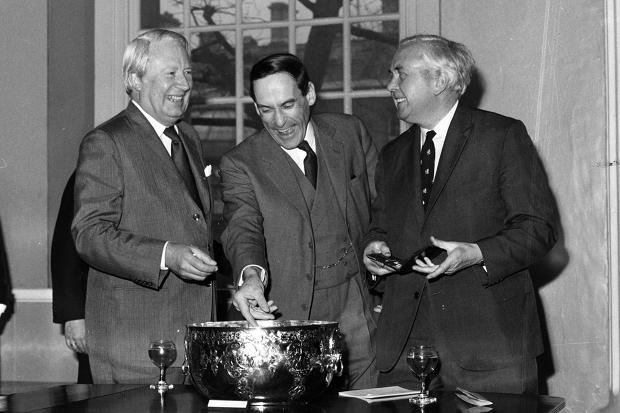 Ted Heath, Jeremy Thorpe, and Harold Wilson.
Ted Heath, Jeremy Thorpe, and Harold Wilson.
The few people who remember Jeremy Thorpe today most likely recall the debacle that ended his career in 1976 when his name was regularly in 30-point type on newspaper screamers at every tube station in London and throughout Great Britain. He was a homosexual at a time when homosexuals in important positions were, in addition to the social, religious opprobrium, and illegality, were regarded as security threats thanks to Guy Burgess. Added to the animal satisfaction, in Thorpe’s case there was the added appeal of the secrecy, melodrama, and theatricality of secret homosexual liaisons. Such was his discretion that even well-known homosexuals who knew him did not realise he shared their orientation, though in time he became less and less discreet. The author gives quite a compelling account of how homosexuality meshed with Thorpe’s personality without descending into the prurient details of an ABC interviewer. Though a good number of people came to know of his homosexuality over the years, including the police and security services, they turned a blind eye but I am not sure why because as Liberal leader he had access to security and defence briefings. There many boyfriends and they came and went. But one of them, Norman Scott, plagued him for years and years and years. Asking for money, bragging to others of his hold on Thorpe, writing letters to Thorpe’s mother, appearing at Thorpe’s parliamentary office. Scott was by all accounts mentally disturbed though he was good looking and could be personable in short bursts. Thorpe tried for years to find a niche for him, securing a number of jobs for him while giving him money. Scott soon wore out his welcome at the jobs and came ever back to Thorpe for more, and more, and more. He even denounced Thorpe to the police who duly noted the allegation and ignored it, noting that Scott had spent time in more than one asylum.
In 1976 Scott’s life was threatened by a man with a gun who killed Scott’s dog. Did Jeremy Thorpe have anything to do with this…well, there is the mystery? He resigned as leader, very reluctantly, under great pressure from his parliamentary colleagues. Three years later there was a trial for conspiracy to commit murder and Thorpe was one of four arraigned, and it all came spilling out in every last detail. It was a feast for the carrion of the media and every morsel was chewed, belched up, and chewed again. His legion of friends and admirers melted away. The men involved, apart from Thorpe, were dubious characters and with chequered histories. Several were accomplished and repeated liars, and should they now be believed? In the end they were acquitted and Thorpe tried to turn that into a victory, but in the course of the trial a great deal had come out of the tube that would not go back. He ran again for parliament and lost….
In the midst of this sage with Scott, Thorpe married a women who knew his homosexuality but like many others found him engaging, and she enjoyed the glamor or Westminster, lunches at the Palace, trips to exotic Africa, and so on. Moreover, they shared intellectual interests in art and architecture. Many observers have since said that he changed as a result, became less theatrical, more relaxed, more confident. Thorpe timed his surprised wedding to upstage a coup against his leadership in the party, and it worked a treat. She was killed in a car accident two years after marriage and he went into a stunned silence for a year and a half. Emerging only occasionally to perform his public duties. He did re-marry on similar terms and this women stuck with him through the ordeal of the trial.
The book is lively and replete with incidents and colourful characters but at 600 pages the detail is so great, the names carpet bombed that I was lost most of the time. The pages are dotted with endnotes to sources of the assertions made and events reported, and replete with asterisked explanatory notes on the characters at the bottom of every other page or so. The author worked on this study over a 25-year period, interviewing everyone and anyone who knew, saw, worked with or against Thorpe, including Thorpe himself. It is all very dense. The length might also seem disproportionate to Thorpe’s achievements. As far I could tell, despite his many pronouncements no cause, no legislation depended on his advocacy his voice, vote, or his action. On the other hand, had he been silent or opposed these matters, then perhaps their progress might have slower. And he was one of the founders of Amnesty International, a tireless advocate for European union, and an effective publicist for the British Commonwealth as a model of cooperation. Even more impressive is to know that many of his most compelling speeches were unscripted.
In common with most contemporary biographers, Bloch says nothing at all about religion in Thorpe’s life, though I expect his parents were churchgoers and he must have been, too, as a child and boy. Not quite, there is one reference half way through within wife died and Thorpe spoke of the spirit living on.
There are a lot of might-have-beens in Thorpe’s story. Had he joined Conservative or Labour he would certainly have made it to the front bench and perhaps leadership. Had homosexuality not been illegal and socially unacceptable, he would have perhaps been even more successful as Liberal leader, because hiding his life as a homosexual must have drained a great deal of energy and concentration from his day job, and hiding it finally undid him. Had he followed the advice of several friends to call the bluff of his nemesis and get it over with once and for all even that meant going public, he might have weathered it.
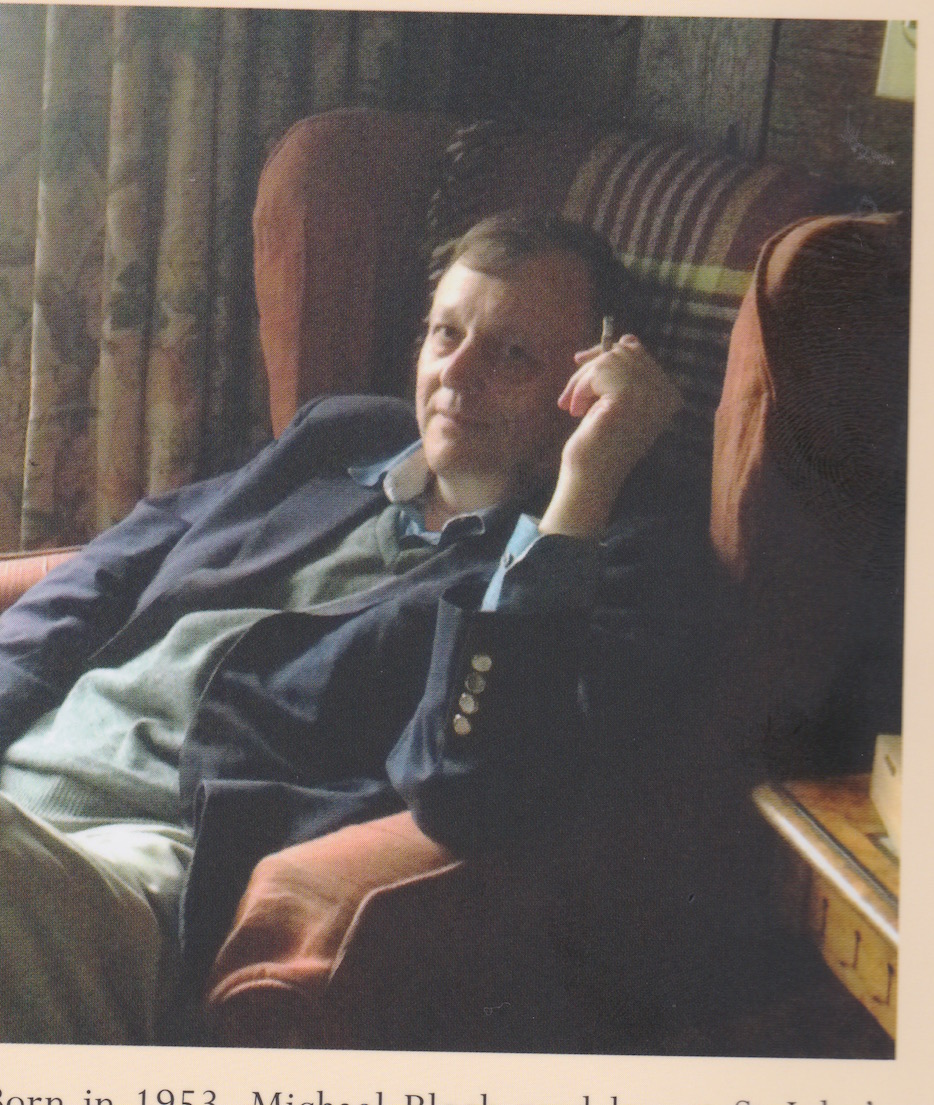 Michael Bloch
Michael Bloch
The book delivers on the potential seldom realised in the biographies of showing that the boy fathered the man. The traits, attitudes, postures, affectations of young Jeremy formed the man he became. Indeed it does that explicitly and effectively.
‘A reformer of the world’
Reading Nicholas Capaldi’s biography put me in mind of John Stuart Mill’s ‘Autobiography’ and I found I had it on Audible already, so the rest was easy, well not quite. See below.
Although his voice was a clarion for social equality and personal responsibility, generations of students have since been taught to despise him as a progenitor of evil liberalism. Sounds odd I know but since the 1970s jaded intellectuals have made careers biting the hand – liberalism – that feds them, having insufficient imagination to do anything creative themselves. When these pygmies are long gone, John Stuart Mill’s books will still be read; that will be the judgement of history.
Mill started to write the ‘Autobiography’ when he a nervous breakdown early in life and then went back to it later. In addition, Harriet Taylor had a hand in editing it. Many PhDs have been earned trying to figure out when Mill wrote portions of it, and what Taylor took out or put in. The Audible version I listened spared me this detail.
The early chapters are a description of the childhood of this prodigy with an emphasis on his father’s method of educating him. It is exhausting to listen to the account, the more so knowing, as he must surely have himself known in retrospect, that most of it was meaningless. Prodigious, yes, but not lasting or meaningful. He may have read in Greek Plato’s ‘Apology’ at five years of age, but he did not understand it. So, too, with much else in this force-fed education, which was all work and no play everyday for years on end.
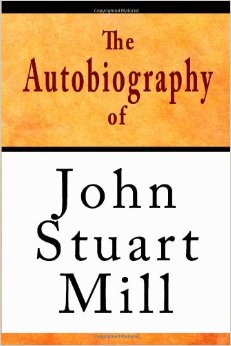
One unintended consequence of this gruelling education was that Mill was a Galaxy-class nerd. He grew up in a hothouse that he seldom left until he was a late teenager when he went out of the house to go to the East India Company where he worked for his father. He was in his father’s shadow for much of his life everyday, socially, intellectually, morally. It is painfully apparent to an auditor of the ‘Autobiography’ that Mill had no friends. He had peers; he had colleagues; he had associates; he had debaters and opponents. But he had no friends, which he as much as says more than once. Part of the reason for that is that he had no interests but the unforgiving logical analysis of important matters learned from and constantly reinforced by his father. This is not the person to sit next to at dinner. He could debate the great issues of the day but he could not make small talk, or show any interest in pictures of a seat-mate’s children. A cold fish, I would guess. Ready to beat you to death in argument and inept in passing the butter. That he never played any boyish games meant he had zero physical dexterity, hence the comment about the butter.
Chapter Five (5) is superb. In it Mill reflects on his many and varied experiences, and knocks off some bon mots as only he could. He paraphrases Thomas Hobbes’s remark that ‘When reason is against a man, he retaliates by being against reason’ which made me think of all those deniers (climate change, Catholic Church pedophilia, Holocaust, etc.). I listened to this while walking the dog, pushing pedals at the gym, or taking the train, so I could not take notes or mark-up the text.
HIs conclusion in this chapter is that political theory is best confined to a few principles which would allow inferences to be drawn in particular circumstances, rather than trying to lay down a set of single ideal institutions. Like Miguel Unamuno’s story about Don Emmanuel, Mill lost faith in a singularly unified theory and recognised the inescapable influence of context. (Unamuno’s story made an impression upon me, Don Emmanuel is a village priest who loses faith in god. Read it.) Under the influence of Alexis de Tocqueville, Mill wanted the deductions to be based on facts, hence I referred to inferences above.
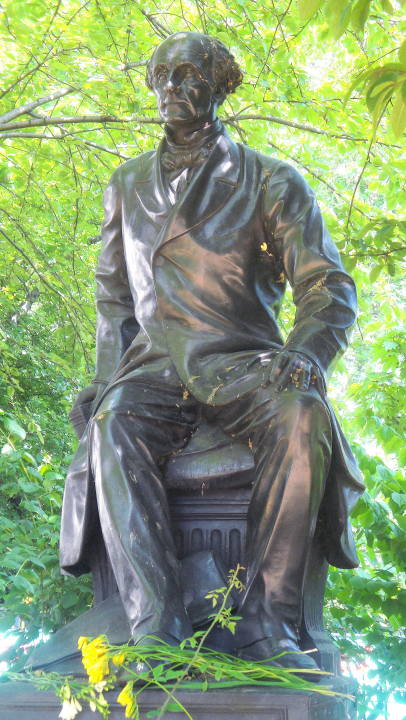 John Stuart Mill, London, The Embankment
John Stuart Mill, London, The Embankment
Likewise, Mill concluded that perfect political institutions were of no value in themselves. The underlying social order was decisive. The most perfect political institutions would be hollow shells unless the society valued and embraced them for their purposes. To make a comparison, the church may be full, but do they really believe? Did they act like Christians everyday, or only for a couple of hours on Sunday?
Mill once fancied himself ‘a reformer of the world,’ but during his depression, he asked himself this question: If all the material and moral ideals he espoused were realised in the world, would he then be happy? No, he answered. He concluded that happiness if not an end in itself, but rather a by-product of purposeful activity. Both trip and arrival are important.
There are some odd things about the ‘Autobiography’ to be sure. Mill never mentions his mother though there are many, many references to his father who died when Mill was thirty (30). It would seem his father had those nine (9) children all by himself. James Mill was a formidable fellow but he was no hermaphrodite. While there are only a few early references to Mill’s work for the East India Company. Yet Mill specialists have some strange stories about his habits at work.
This review affords an opportunity to correct some errors I made in the review of Capaldi’s biography. It was not Bentham that introduced Mill to poetry. Several peers led him to poetry. I also said he was called a Mechanical Man, not quite, but rather a Manufactured Man by some who found the analytical engine of his mind artificial and inhuman.
I found this Audible reading to be unsympathetic. It sounded almost mechanical, phrases of equal length and inflection followed one another without regard to the content. Perhaps that is partly a fault of Mill’s writing style, which is replete with dependent, relative, and embedded clauses with asides and comparisons which makes it precise but it has no flow.
Not quite easy I said, because Audible kept dropping out, asking me to log in again, resetting the book mark, and so on. None of that is easy when using the iPhone while dog walking. No doubt I brought this on myself, somehow. But it was annoying, and a lesser man might have quit.
‘The Life of Girolamo Savonarola’ (1952) by Robert Ridolfi
Savonarola (1452-1498) was a critical figure in the history of the city of Firenze (Italia). Born to a comfortable family he learned Latin as preparation for a career in law or medicine. But a dream when he was twenty (20) convinced him to renounce the world and take orders in a Dominican monastery. His sleep then, as throughout his life, was troubled, perhaps by ulcers, speculates Ridolfi. In this troubled sleep he feared for his immortal soul because, well, he was a young man and his thoughts often turned to young women.

Giro never did anything by halves. He left home at night leaving a letter behind and entered the Church never to leave. Thereafter he had little contact with his parents or siblings. Then his apocalyptic thoughts turned from himself to all mankind.
Though well educated he had a thick accent from his region, Ferrara, north east of Bologna. This marked him as an outsider wherever he went. He was holier than thou and was sent from place to place by his Order (Dominican) trying to find a place where he fitted in, did something useful, and was content. He had few chances to preach but when he did the message was repentance. He was assigned to a monastery in Fiesole just outside Florence. This building is now part of the European Universities Institute where I spent a semester once upon a time.
With his Ferreranese accent, his gloomy message, and his blunt manners he did not fit into Florentine society at the birth of Renaissance where the emphasis fell on elaborate manners, rich clothing, refined tastes in religious art, sensual music, and optimism about the future at the time of Lorenzo il Magnifico (a conventional honorific that was descriptive in this case). After a brief residence, Giro was sent away on other duties, but he later returned. In the meanwhile he had an epiphany, being called by God to scourge the world of sin, he said. A big job for one humble monk but he shouldered it. He began to preach with a newfound confidence, speaking slowly and in simple phrases, though always in Latin, he denounced arbitrary taxes that deprived humble people of the means of honouring god by giving alms. He denounced those who lavished money on useless trinkets, i.e., fine clothes, paintings, sculptures, etc. in the city where Leonardo da Vinci and Michelangelo were hard at work, and Filippo Brunelleschi had made that great dome.
 Statue of Savonarola in full flight, Ferrara.
Statue of Savonarola in full flight, Ferrara.
His populist message found a constituency and his sermons attracted ever more auditors. Lorenzo tried to get him re-assigned elsewhere but the letter was lost in the Italian postal service where millions have followed them. (I got my letter of appointment to EUI about ten months after I returned from my tenure there. Thank goodness for faxes in those days). Larry then tried hiring some competition, and brought in some other, more showy, and acceptable preachers to no avail. He also tried to coax Giro into a more reasonable approach by asking a few local intellectuals to befriend him, which they did and both were won over by Giro’s sincerity and intellect. Hmm. He finally tried money but Giro gave it to charity. Then, considering it all small potatoes anyway, Lorenzo ceded the field.
In Milan Il Moro had invited the French King Charles VIII to support his rule, and Charles found Italy congenial. There was no match for the French army and King Charles, like some many other later tourists, found the shopping excellent. His army would appear, and whole towns and cities would surrender everything to him, gold altar pieces, oil paintings, rich silks, musical instruments, tapestries, fur coats, chests of gold, and a good number of women. He shipped home tons of boodle to stock up the Louvre.
Spain had a matrimonial alliance with Naples and soon enough these two incipient nation-states fought out their war in Italy over the next generation. The micro Italian city-states made shifting alliances with each other and France or Spain as seemed opportune. Venice watched with one hand on the sword, while the Pope in Rome schemed and plotted in hyperdrive. Cesare Borgia supported by his father, the Pope, seized his opportunity to create a kingdom in Romagna. Think of Afghanistan today, that is the picture.
When Charles appeared near Florence, Piero de Medici who had succeeded Lorenzo set a record in the speed of his surrender thus forever sacrificing the support of Florentines who, being traders, expected him at least to bargain. Charles was not at all sure that Piero could deliver the goods, and bided his time. Then the Signoria sent a delegation of four to plead with the king to spare the city. Because of his perfect Christianity, Savonarola was one of the four. He found common ground with Charles by appealing to his Christianity and Charles spared the city. Giro was hailed as a hero. It is more complicated than that but it seemed to everyone that Giro had saved the day.
Giro had also had visions and predicted the future a few times, and enough happened to make the predictions credible. His direct line to God seemed very real. No wonder then that on occasion his sermons would attract 15,000 people. He was a celebrity by word of mouth. Crowds would gather to watch him walk between buildings, hoping that by proximity some of his divine grace would come to them.
During a calm period, the elders of Florence asked his advice (remember that direct line to the divine) on government. He suggested a process of generating and evaluating alternatives that results in three constituent bodies. What is impressive is that he suggested a process and did not simply say do this or that.
He also counselled moderation and clemency when hot heads wanted to exact vengeance on the followers of the Medici. His many enemies, including Medici loyalists, tried to trick him into making more prophecies but he proved astute in not biting. His oracular statements were few, making them all the more mysterious and remarkable. His fame spread throughout Italy. A Venetian ambassador was instructed particularly to observe and report on his activities.
Savonarola seems to have established some kind of relation to King Charles VIII of France during the latter’s several Italian campaigns, which Giro used to protect Florence. This elevated his status still more, but not with the Mediceans (though King Charles was reserving his options by tolerating the current Medici pretender in his entourage).
Factions in Florence rejected Savonarola’s castigations and threats of damnation and petitioned Pope Alexander VI (Borgia) to reassign, recall, criticise, and finally excommunicate him. The Pope went through the motions at first but did not follow through, until…. King Charles threatened Rome again, then the Pope tried to coerce Florence into joining the Venetian League against France and if it did, then he would tolerate Savonarola. If it did not, he would excommunicate him. This see-sawed for a while and further divided opinion Florence.
The executive of the Florentine government was elected every two months, and it oscillated both as to the emphasis placed on Savonarola and its support for him. In June the executive petitioned the Pope to recall Giro, and two months later another, new executive proposed his sainthood. Back and forth it went.
Meanwhile, Savonarola – becoming more extreme and apocalyptic – challenged believers to sacrifice their most precious belongings at Lent, not just forgo their use (say by draping statues or turning paintings to the wall which had sufficed previously). This happened in two successive Lents. The second time the pyre of goods (silk clothes, paintings, statuary, musical instruments, sheet music, books, manuscripts, etc) was so impressive than the Venetian ambassador offered 20,000 gold ducats for it, but Savonarola refused. That is an enormous sum. He must have been biding for the city of Venice because no individual had that many gold ducats. Earlier Giro might have taken the dosh to succour the poor, widows, orphans, cripples, the sick, but he had become more and more obsessed with symbols in the mystified world he inhabited.
His sermons also become more hellfire and brimstone, and he became much more agitated, voluble, and loud when he preached and began to pound the banister on the pulpit in castigating his congregation. In the streets there were clashes between his supporters and opponents resulting in injury and death. When King Charles VIII lost a couple of battles, Giro’s big brother friend no longer intimidated his local opponents.
The Pope’s efforts to discipline Giro got nowhere, but he wanted Florence, perhaps the richest city in Italy at the time, on his side and against the French. The last card was to threaten to excommunicate all of Florence. While many Florentines individually might have agreed with Giro that the Pope, being irredeemably corrupt, had no divine mandate to do this and laughed it off personally, it also meant an interdict on Florence so that no Christian would trade and do business with it. That is, it threatened the livelihood of the city and the fortunes of those who thrived on trade and business, which was most of them. That was serious!
Savonarola was also increasing erratic, even rejecting as evil sinners those who tried to help or protect him.
The Pope finally took more enegetic action, but the Signoria beat him to it. Savonarola was arrested and tried as a heretic, tortured repeatedly over several weeks, until brought to a point where he would confess anything, which he did. He was then hanged and burned in a public spectacle in the Piazza della Signora, where we many tourists have admired the replica of Michelangelo’s David. In all likelihood Niccolò Machiavelli, about 28 at the time, saw this. He has a few words to say about unarmed prophets later in ‘Il Principe.’
Giro published a lot of his sermons, and his acolytes acted as amanuenses at times and wrote his words down. To true believers he was a saint in all but name, and they spread his fame. Visitors to Florence looked at the art work and at Giro. He was also a prodigious letter writer and many remain.
Martin Luther was at it up north during this time, and he is the obvious comparison. Giro was less interested in denouncing the corruption of the Papacy than in saving souls by abnegation. He was also less egotistical than Luther, at least as portrayed in Erik Erikson’s biography ‘Young Man Luther’ (1958).
There is no doubt that Ridolfi’s sentiments lies with Savonarola. He smooths over some of Giro’s behaviour which I have read about in other studies of the time and place, e.g., he minimizes the bonfires of the vanities at Lent. Giro really whipped believers up to do this, and he encouraged them to break into public buildings and private houses and steal valuables to be burned, and no matter how much was burned it was no enough.
These days Giro is known to many tweeners as a character in Assassin’s Creed. To find out more about that, ask any 12-year old boy.
This English translation is minus the footnotes, though the text makes many references to sources and archives, these cannot be traced with this edition.
Michel Basilières. ‘A Free Man’ (2015)
In which Skid tells the story of his life, or a part thereof, to our nameless narrator who is trying to finish his second, long over due, novel, i.e., Basilières’s alter ego. Though a work of fiction it has some of the layout of nonfiction. There is a preface, and the text has footnotes that supplement the dialogue. The setting is contemporary Toronto.
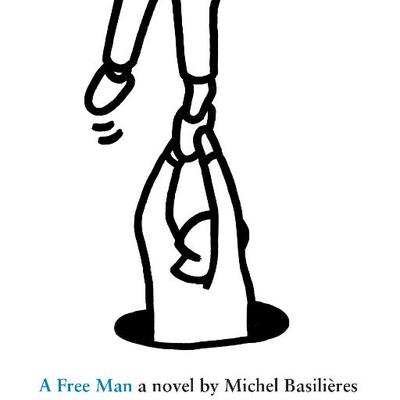
Skid’s efforts are hindered by a Lem, a shape-shifting monkey from three hundred (300) years in the future. Yep! Lem tries to convince Skid that he is needed in the future. To do that Lem pops up at very inopportune times. Lem does that, pops up.
In the Preface our deuce Basilières makes it clear that he has laboured under expectations for a second novel since his marvellous first one (‘Black Bird’ in 2004), and that he had given up but would pass along this story from his friend Skid. Skid works in a bookstore and lusts after the female employees and customers, but being a terminally inept nerd he gets no further.
It sounds rather like Basilières himself, who works in a Toronto bookstore….
When a writer, or anyone else for that matter, speaks of the expectations – demands – of customers I am reminded of that Stephen King story ‘Misery’ about the writer trapped by a fan and chained to typewriter to produce more stories, and getting whacked by a baseball bat if the stories are not up to standard! Whack!
 Michel Basilières
Michel Basilières
Some authors are one book authors, I have heard, and perhaps that applies here. Sympathise as I do for the angry and demanding god Expectations, the novel bears no relation to the exhilarating Black Bird. I am turning the pages through it in honour of that first novel. Let’s hope, however, that getting A Free Man out might stimulate Basilières to stick to the keyboard, and try again.
